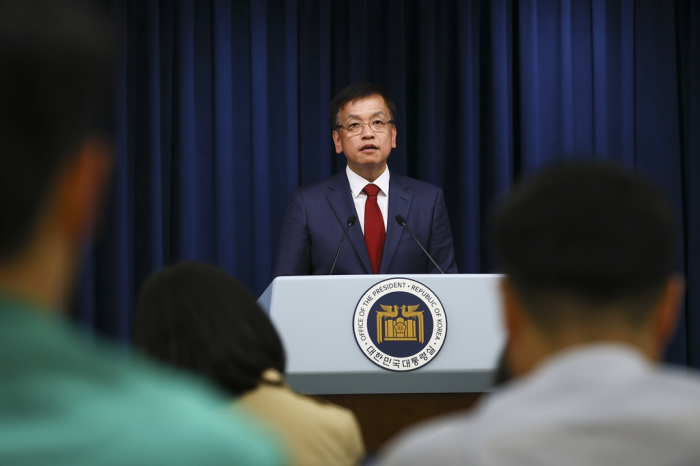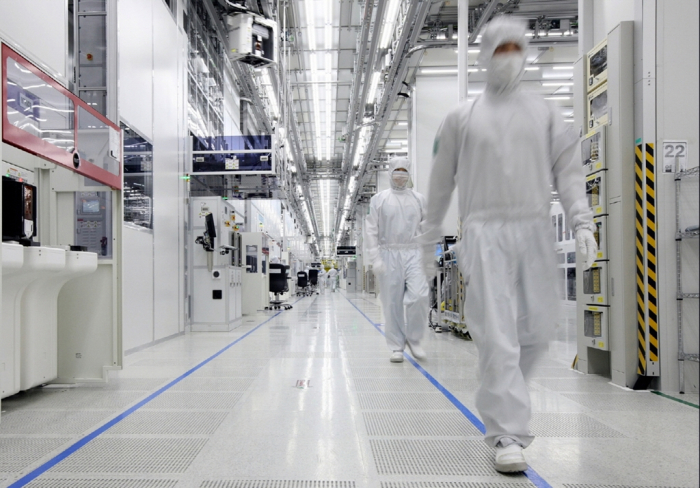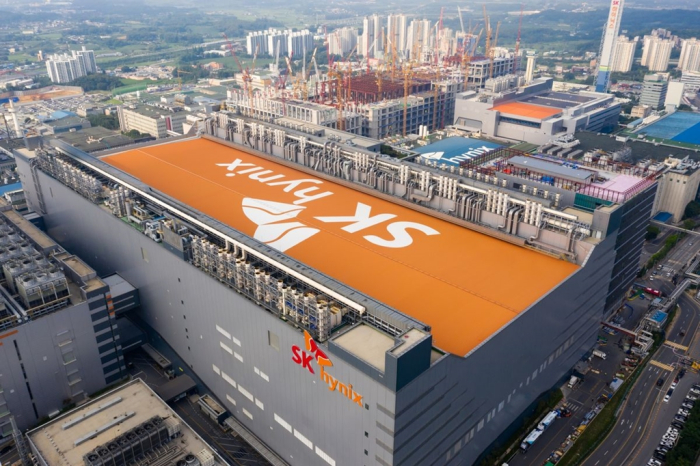Business & Politics
Samsung, SK granted indefinite US waiver on chip gear supplies to China
Despite Washington’s move, uncertainties remain and the chipmakers will likely cut their China production, analysts say
By Oct 10, 2023 (Gmt+09:00)
3
Min read
Most Read
LG Chem to sell water filter business to Glenwood PE for $692 million


Kyobo Life poised to buy Japan’s SBI Group-owned savings bank


KT&G eyes overseas M&A after rejecting activist fund's offer


StockX in merger talks with Naver’s online reseller Kream


Mirae Asset to be named Korea Post’s core real estate fund operator



Samsung Electronics Co. and SK Hynix Inc., the world’s two largest memory chipmakers, have been granted an indefinite waiver on semiconductor equipment supplies to their factories in China – a move expected to help their technology advancement and strengthen the global chip supply chain.
The US government allowed the two South Korean chipmakers to acquire US-made chipmaking devices without separate US approvals, Seoul’s presidential office said.
“The US decision has greatly eased uncertainties over Korean chipmakers’ operations and investments in China,” Choi Sang-mok, senior presidential secretary for economic affairs, told a media briefing on Monday.
The US government has already notified Samsung and SK of its decision, indicating that the move is in effect, according to Choi.
Last October, the US government unveiled sweeping chip-related export controls on China, while granting some leading chipmakers, including the Korean duo and Taiwan’s TSMC, a one-year reprieve to allow them to upgrade their facilities there.

Under the controls, chipmakers are banned from importing chip equipment to make 18-nanometer or less DRAM, 128-layer or thicker NAND flash, and system chips requiring 14 nm or less process node.
Samsung and SK have since halted new investments in China while awaiting Washington’s next move given the approaching end of the one-year grace period.
In May, industry sources said the US Commerce Department is in talks with Korean officials to work out separate equipment import standards to enhance non-Chinese chipmakers’ business predictability and minimize global supply chain disruptions.
Following the US government’s latest decision, Samsung and SK Hynix will be included on the Commerce Department’s “validated end user (VEU)” list, which means they will be allowed to keep supplying certain US chipmaking tools to their China factories without obtaining permission.
Samsung and SK welcomed the US decision, saying they will do their best to stabilize the global semiconductor supply chain.
In China, Samsung operates a NAND flash memory chip plant in Xian and a chip packaging facility in Suzhou. SK Hynix runs a DRAM chip plant in Wuxi, a NAND plant in Dalian and a packaging factory in Chongqing.

The two companies controlled nearly 70% of the global DRAM market and 50% of the NAND flash market as of end-June, data from TrendForce showed.
UNCERTAINTIES REMAIN
Despite the indefinite US waiver, however, uncertainties remain over the Korean chipmakers’ business in China given the ongoing chip supremacy tug of war between Washington and Beijing – Korea’s two largest export partners.
According to the so-called guardrails or detailed guidelines of the US CHIPS and Science Act finalized on Sept. 21, chipmakers cannot expand output in China and “foreign countries of concern” by more than 5% for advanced chips and 10% for older technology, or legacy chips, over the next decade.
Legacy chips, as defined by the US, are logic chips produced with 28 nm or larger technology; DRAM chips manufactured with an 18 nm or higher process node; and 128-layer or thinner NAND flash memory chips.

The guardrails are part of Washington’s efforts to thwart Beijing’s chip supremacy ambitions while securing the supply of the components that underpin advanced technologies, including artificial intelligence and supercomputers as well as everyday electronics.
In May, the Korean government asked Washington to ease part of the guardrails.
The CHIPS Act provides up to $52.7 billion in subsidies to chipmakers that invest in new production facilities in the US but allows Washington to take back incentives from the recipients if they violate guardrail provisions.
Samsung is building a $17 billion foundry factory in Taylor, about 25 km from Austin, where its current contract-manufacturing operations are located.
Analysts expect Samsung and SK Hynix to gradually slash their investments in China and reduce their production volumes in the country to limit any collateral damage from the US-China dispute.
Write to Ik-Hwan Kim and Hyeong-Ju Oh at lovepen@hankyung.com
In-Soo Nam edited this article.
More to Read
-
 Supply chainKorea’s heavy dependence on China for raw materials deepens
Supply chainKorea’s heavy dependence on China for raw materials deepensSep 12, 2023 (Gmt+09:00)
4 Min read -
 EconomySouth Korean exporters jittery as China's slowdown raises red flag
EconomySouth Korean exporters jittery as China's slowdown raises red flagAug 30, 2023 (Gmt+09:00)
3 Min read -
 Business & PoliticsSouth Korea officially asks US to ease chip rules on China expansion
Business & PoliticsSouth Korea officially asks US to ease chip rules on China expansionMay 24, 2023 (Gmt+09:00)
4 Min read -
 Business & PoliticsUS eyes new rules for Samsung, SK to bring chip machines to China
Business & PoliticsUS eyes new rules for Samsung, SK to bring chip machines to ChinaMay 10, 2023 (Gmt+09:00)
3 Min read -
 Korean chipmakersSamsung’s $17 billion new chip plant in Taylor aims to rein in TSMC
Korean chipmakersSamsung’s $17 billion new chip plant in Taylor aims to rein in TSMCNov 24, 2021 (Gmt+09:00)
4 Min read
Comment 0
LOG IN


